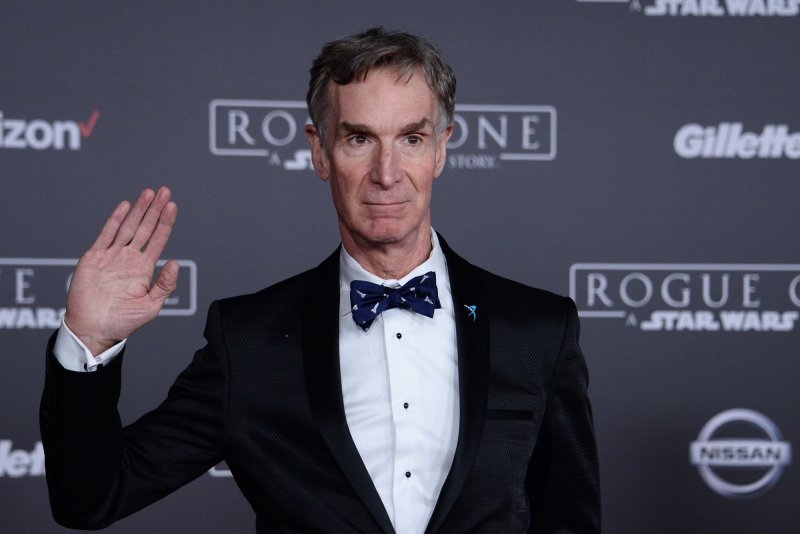1 of 2 | Science educator Bill Nye attends the premiere of "Rogue One: A Star Wars Story" in Los Angeles in 2016. File Photo by Jim Ruymen/UPI |
License Photo
June 15 (UPI) -- Scientist and educator Bill Nye says he expects climate change policy to shift quickly -- as soon as the next generation of young students becomes eligible to vote.
"I think the tide will turn very quickly," Nye told UPI in a recent interview. "My prediction is three presidential elections."
Nye believes in a multifaceted approach to climate change -- a combination of public policy and political advocacy, scientific education and technological innovation.
"It's everything all at once," Nye said. "Not doing one thing instead of the other."
His optimism for rapid change is rooted in his faith in young people and their appreciation for the dangers of global warming. Young people realize -- like he does -- that humans have the resources, technology and know-how to power the world's economy with renewable energy sources.
What people lack, at the moment, he says, is the will. That could change with the implementation of a carbon tax, which would force economies to account for the full costs of the environmental the damage caused by burning fossil fuels and releasing CO2 into the atmosphere.
"It would encourage a lot more innovation," Nye said.
The government, Nye says, needs to do a better job of creating a regulatory environment that encourages green energy innovation. He cites the public-private cooperation that produced America's railroad system and the Internet.
"This is doable, what we want to do is work the problem from the bottom up to meet the demands of consumers for electric vehicles and sustainable energy and from the top down to ensure the right policies and regulations are in place to encourage the investment needed to meet those demands," he said.
Nye was in Washington, D.C., last week to recognize the national winners of the 26th annual ExploraVision program, a competition that asks students to conceive of and communicate a scientific technology that will come to fruition 20 years in the future.
One of the winning teams, a group of students from Ward Melville High School in New York, conceived of a solar cell capable of converting a larger percentage of the solar spectra using multi-walled carbon nanotubes.
Nye says innovations like the solar cell technologies imagined by Long Island high-schoolers don't arrive as the result of disruption, but are the results of years and years of steady progress.
Scientific innovation that will allow the United States and other economies to wean off fossil fuels and develop greener energy will come slower.
"I like to discourage the term 'breakthrough' or 'disruptive' or 'outside the box,'" Nye said.
Part of the reason Nye supports ExploraVision is its commitment to young scientists and to scientific collaboration.
"You start in kindergarten," Nye said. "It gets people working from the get-go."
Nye's mantra of everything all at once also applies to science education.
As creator and host of the popular PBS children's science show Bill Nye the Science Guy, Nye is most famous for making science intelligible and engaging for young people. Now he works on a more adult science TV show, in its third season on Netflix. He says his approach to science communication remains largely the same.
"Doing the Science Guy show, intended for 10-year-olds and based on very good research, getting people instilled with the lifelong passion for science, it's the same idea for adults," Nye said. "Listen to people and use language and vocabulary that is understandable."
But unlike children, adults come with ingrained ideas -- and not always the right ones.
"When it comes to grownups and science education, if you have a misconception about vaccines, for example, you have to be presented with a lot of science over the course of two years," Nye said.















